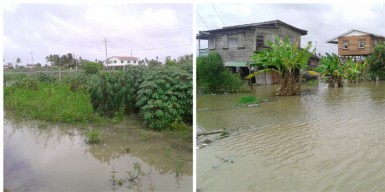An inadequately maintained sluice in Black Bush Polder, East Berbice is being blamed for rain-fuelled floodwaters in the agricultural scheme.
Residents of Mibicuri, North, said the koker has not been serviced for six to nine months. They said that during that time the mud from the sea has blocked the koker making it impossible for the door to open. Koker maintenance has been a recurring problem in Black Bush Polder.
According to the residents, when they enquired from the Neighbourhood Democratic Council (NDC) as to why the water was not going down they were told that the contract for the sluice to be cleaned has not yet been awarded. They said that the chairman, Thakurdeen Persaud told them that the contract has to go through the tender board. Persaud could not be reached by Stabroek News for comment yesterday.

Region Six Chairman David Armogan said yesterday the flooding is a combination of the heavy rainfall and the water that had been pumped into the community for farmers two weeks prior to the downpour. He explained that on Boxing Day six inches of rain fell and this caused the water to rise. The chairman said that when the koker doors are opened a maximum of two inches of water is drained off. “With the six inches it would be approximately three days.”
Currently, Armogan said, all the koker doors at Adventure, Eversham and Number 43 village are being monitored. He explained that from the time the tide drops the doors are opened.
One resident opined that the government should not wait until the area is flooded to award contracts for cleaning of sluices and canals. “They should award these contracts in preparation for flooding. So when the sluice has to be cleaned the contractor would be there ready to work,” the resident said.
A few residents also told this publication that the water in Mibicuri is being drained from two kokers; one at Eversham and one at Adventure, Corentyne but because of the amount of water coming into the polder, there is no relief. Residents yesterday lamented that government had enough time in the dry season to clear silt “but they wait until the rain come… The minister [of agriculture] and the Regional Chairman saying that they are prepared for the rainy season but this shows that they were not prepared.”
Addressing the issue of clearing of the canals, Armogan said the region cannot “waste” money on clearing siltation during the dry season because in three days silt mud builds up back. “We have to wait for the rain to have water to flush out the silt… We can’t go and spend 9 -11 million every couple days to clear kokers… We have to wait for the water to meet a certain level then go and operate. With the water at a certain level we would have enough to flush out the silt and clear drainage,” the regional chairman explained.
The chairman also said every time the water drops the rain starts to fall. He said at the moment measures are in placed to drain off floodwaters. Heavy rain would however delay the draining of water.
Residents also complained that President Donald Ramotar, who visited the community on Sunday did not stop and interact with flood-affected victims.
One resident said “We didn’t know was the president passing through the community. This morning we hearing he passed in the community… The people at the NDC didn’t even announce that the president would be visiting in the area.”
Armogan however said that stops were made by Ramotar at every polder and there was interaction.
Residents added that previously they had a small pump which was helping them but it was removed by officials from the NDC for unknown reasons.
Stabroek News during its visit to the area yesterday observed that some of the dams were taken over by knee-high water. It was also evident that the drains were over topping and dams were in a deplorable state. A resident said the conditions of the dams are a result of tractors driving on them.
When Stabroek News passed through the Johanna and Yakusari polders the water seemed to be a bit lower than in Mibicuri. They all suffered losses of cash and rice crops from the flooding.
Janet Sookhoo, 62, a crop and livestock farmer said she lost over 40 chickens after the rain started. “As the water came overnight the entire pen ducked.” Sookhoo disclosed that all her crops like pumpkin, cassava and squash were damaged.
Sookhoo also spoke on behalf of her son who is a large-scale cash crop and rice farmer. She explained that her son’s cash crop losses are over $200,000.
“Look there is two baskets of tomatoes (pointing to the tomatoes) there, waiting to ripe. My son had to pick them green because the flood would have damaged all, but what is the use he picked them green and still it is being spoiled… people don’t want to buy it because it green,” she lamented.
Sookhoo explained that like her son many other residents of Black Bush depend on the cash crops to make a living. “It is very hard to prepare the crops and look after them… and when it is time to reap you have to count losses”, she said whilst adding that her son has his five-member family to “maintain”. The woman also said that thousands of dollars are spent on pesticides, weedicides and labour to look after the crops “and when time for you to get some money flood come and damage everything because there is no drainage in this place.”
Another cash crop farmer, Gangaram (only name given) indicated to Stabroek News that his losses are approximately $300,000. The man said he had planted watermelon, ochro, bora and cucumber and all had perished in the floodwaters.
Gangaram added “I took hymac to make high beds just to avoid loss from flooding but it is just a waste of time and money. This flooding is a yearly something and I don’t know why they cannot put measures in place.”
Vishnu Persaud, a rice farmer said three plots of his rice field are currently under water. He anticipated that his losses would be over $700,000.
Yaridnauth Shirkissoon explained to Stabroek News that he planted over one thousand tomato plants. “Now these plants are bearing and time to reap we cannot reap. The water come and damaged the plants… Look (pointing to the farm) all the tomatoes rotten. We cannot get anything from it,” Shirkissoon said. He said that from his patch of four thousand cabbages only two rows are currently standing. “I had expected to get like $400,000 from this batch…”
A rice farmer Kevin (only name given) from the Johanna polder said the flood has affected his farm greatly since he has not been able to “throw” manure in time. He explained that when the manure is not thrown in time the quality of rice is not “nice”.
Government buildings including the police station at Mibicuri, the NDC office, the Water Users Association office, the Mibicuri Secondary and Primary School along with the Community Centre Ground were flooded.







